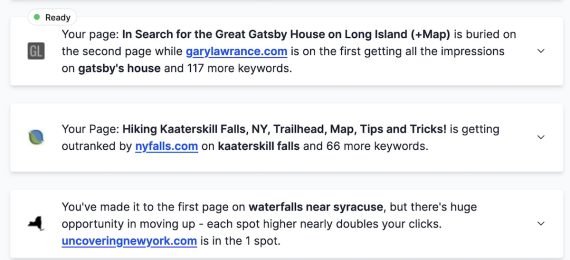Google increasingly relies on artificial intelligence for organic search results. Soon those results will include AI summaries, called “snapshots,” of key info from a query. Hence search optimizers are now deploying AI to analyze rankings.
Here are three search-engine-result-page analyzers that utilize AI.
RivalFlow
RivalFlow from Spyfu uses AI to uncover organic search opportunities. The tool checks a domain’s higher-performing keywords, identifies competitors, and suggests content improvements for a page to improve its ranking.
In my testing, RivalFlow was easy to use — just input a domain — with realistic competitor assessments based on linking profiles and existing organic traffic.
Having entered a domain, the tool returned a list of SERPs with ranking opportunities.
Enter a domain, and RivalFlow will produce a list of SERPs with ranking opportunities. Click image to enlarge.
With RivalFlow I could see the possibilities and implement AI-generated content improvements.
The tool analyzes one domain for free, with access to the SERP report, although a credit card number is required. Paid subscriptions start at $99 per month — $79 if paid annually.
Thruuu
Thruuu is an AI-powered SERP analyzer and content-strategy creator. Thruuu evaluates any search result page and also compares two sets of results. For a single SERP analysis, the tool pulls organic listings, local packs, “People also ask” content, and videos.
For each SERP listing, Thruuu provides the page rank (from the Open PageRank initiative), word count, image count, and page type.
For each listing, Thruuu provides the page rank, word count, image count, and page type. Click image to enlarge.
The comparison feature shows two SERPs side by side, contrasting the headings, related searches, questions from “People also ask” boxes, and frequent terms from ranking pages. The tool then assesses whether a single page can target both queries.
Thruu creates content outlines and briefs by applying generative AI to the SERP data.
Thruuu’s free plan includes 10 Google SERPs, two content briefs, and up to 500 keywords. Paid plans start at $13 per month for 75 SERPs.
SERP Sonar
SERP Sonar is a free Chrome extension that analyzes real-time Google search results and lists data of each ranking page:
- Number of words in titles and URLs,
- Exact-match keywords in titles and URLs,
- Titles and URLs with no exact-match keywords,
- Exact-match keywords in snippets,
- Average word count per page based on ranking URLs.
SERP Sonar provides details of words in titles, URL descriptions, and more. Click image to enlarge.
Analyze 10, 20, or 50 ranking URLs. Export the data — URLs, titles, descriptions — in an Excel file for further analysis.
A separate report provides averages for each ranking page:
- Average word count,
- Average image count,
- Ad networks on page,
- Affiliate networks on page,
- % of pages using Schema.org structured data
- % pages with user-generated content.
Enable a free AI analysis via a (paid) ChatGPT API token. That review uses SERP data to determine Google’s assessment of query intent for a keyword.
For example, I entered “NY waterfalls.” The tool assigned two potential intents.
Informational Intent: Based on the keyword “ny waterfalls” and the titles and descriptions provided, my first highest confidence determination of the search intent is informational intent. The titles and descriptions mention phrases like “New York Waterfalls – Full List by County,” “31 Breathtaking Waterfalls in New York State,” “35 Gorgeous Waterfalls in New York State,” and “17 Best Waterfalls in New York.” These titles and descriptions suggest that the searcher is looking for information about the various waterfalls in New York State. The inclusion of phrases like “full list,” “bucket list-worthy,” and “best” also indicate the searcher’s desire to gather information and explore different waterfall options. This aligns with the informational intent category.
Local Search Intent: My second highest confidence determination of the search intent is local search intent. Although the titles and descriptions mostly focus on providing information about waterfalls in New York State, the mention of phrases like “Upstate NY + Near NYC” and “Finger Lakes Waterfalls” hint at a more localized search intent. The searcher may be specifically interested in finding waterfalls near their location, either in Upstate New York or near New York City. Additionally, the inclusion of phrases like “A NY local’s list” and “before you die – newyorkupstate.com” further emphasizes the local aspect of the search. Therefore, it is possible that the searcher is looking for specific waterfalls to visit in their local area, indicating a local search intent.
The AI analysis also provides title and meta-description suggestions, stating, “By feeding the keyword plus ranking page title tags, the AI is able to provide more nuanced title ideas that are tuned to the competitors that are actually ranking in the SERP.”
Here are the suggestions for “NY waterfalls”:
- “Discover the Hidden Beauty of New York’s Waterfalls,”
- “Unveiling New York’s Best Kept Secret: The Spectacular Waterfalls,”
- “The Ultimate Guide to Exploring New York’s Mesmerizing Waterfalls,”
- “Embark on an Adventure: The Most Captivating Waterfalls in New York.”



